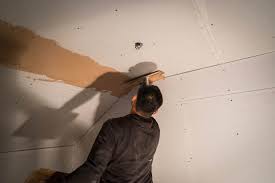What Does It Take To be A Plasterer?
Have you just left school and want to take up a career as a tradesperson but aren’t quite sure which trade is right for you? Perhaps you have already forged a career but fancy a change of direction and feel like plastering is something you would be good at. Whatever your situation, it is important to think about what steps you will need to take to reach your goal; so, what does it take to be a plasterer?
A plasterer needs to be able to work well with their hands and they’ll need a keen eye for detail. You will need to be physically fit since this can be a demanding job and you’ll need to complete a college course or apprenticeship to get into the job role.
But there’s a lot more to becoming a plasterer than just this and while it may have a reputation as an ‘easy’ job, any qualified plasterer will tell you that certainly isn’t the case.
What Skills Do You Need To Be A Plasterer?
If you’re thinking about becoming a plasterer, one of the first things you will need to think about is your level of fitness. Plastering can be a very physically challenging job so you will need to make sure that you are up for this on a daily basis. Moreover, you may be working at heights and so if this is something you would have a problem with then plastering might not be right for you.
In terms of skills, you will need to have a good knowledge of the construction industry as well as being able to work well with your hands. As a plasterer, you will often be working as part of a team so you’ll need to have good communication skills and be able to take criticism where it is due, adapting your work as needed.
Of course, you will also be working with customers so having good customer service skills is a must, especially if you are running your own business. While you may be working as part of a team, you’ll also need to use your initiative and make decisions.
What Qualifications Do You Need To Be A Plasterer?
In theory, you don’t actually need to have any qualifications in order to sell plastering services. Unlike some other types of trades, you don’t need to be certified and can set up a business with little to no experience.
Of course, this isn’t always the wisest decision and if you want to succeed in your career and be above the rest then obtaining qualifications is the best idea. There are different levels of plastering courses and it is perfectly possible to take a DIY plastering course if you’re just looking to be able to perform your own renovations.
However, if you’re going to be applying for jobs in the trade or want to have a reputable self employed business then you will be better off doing an NVQ Level 2 in plastering or a Level 3 Advanced Technical Diploma in plastering. You can also take a T Level in on site construction which would cover everything you need to know.
Some people do not like the idea of spending hours on end in the classroom and find that they develop their skills much more easily when working hands-on. In this case you could take a plastering apprenticeship. This will allow you to spend four days a week working under the guidance of a qualified plasterer while the fifth day each week will be spent at college.
The great thing about taking an apprenticeship is that you will be able to earn as you learn. While the minimum wage for apprentices is lower than the National Living Wage, it is certainly more than enough to keep you going while you go through your training.
For the most part, you will need at least 2 GCSEs to enter a Level one course and up to 5 GCSEs when working towards a Level 3 diploma. If you cannot or do not want to follow this route, you may take on a job as an assistant to a plasterer and work your way up to this role. However, it’s worth noting that this is not the same as an apprenticeship and you won’t come out of it with any formal qualifications.
Related Article: What Jobs Does A Plasterer Do
How Long Does It Take To Be A Qualified Plasterer?
If you have chosen to go down the route of a Level 2 qualification in plastering then you can expect to spend around two years completing your training. It may be possible to do a part time course around your current commitments but of course, this will increase the amount of time it takes to qualify.
For a plastering apprenticeship, you will be expected to work for 30 hours a week and your time will be split between the workplace and college. Once again, this usually takes around two years to complete. You will then be fully qualified to work in the trade and be considered professional.
Can You Teach Yourself To Plaster?
It may be possible to teach yourself how to plaster through online videos, books and a lot of practice but generally speaking, this is an intricate job that is better learned through the correct channels. You will need someone to show you the basics and how to get the best finish. For this reason, it is always advisable to have the proper training. Furthermore, if you want to work as a self-employed plasterer then having qualifications will show your clients that you know what you are doing.
Conclusion
To be a plasterer in the UK, you don’t need to have formal qualifications but it is best to obtain these. You can do a college course or an apprenticeship to get there and you’ll need great physical fitness as well as a keen eye for detail and excellent communication skills.
